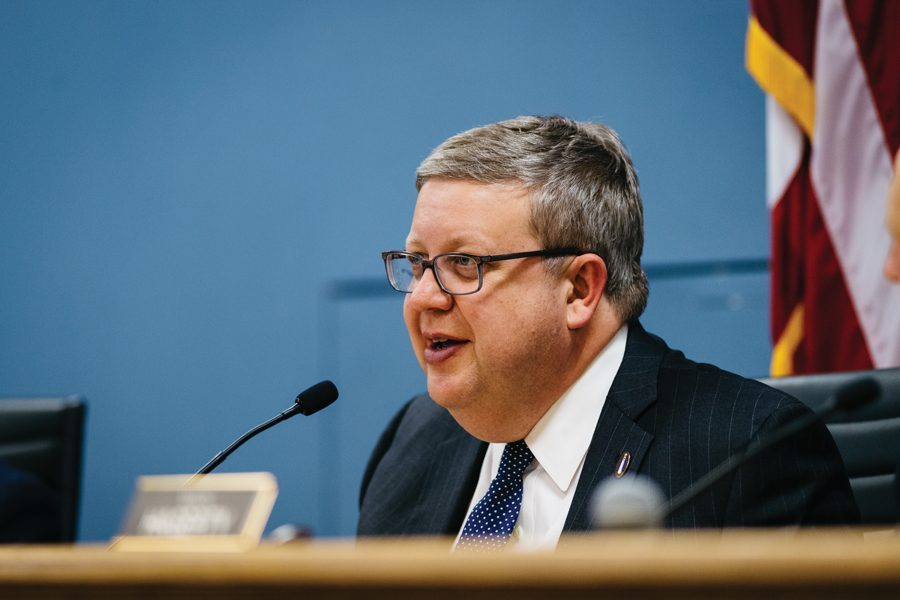City’s budget deficit projected at $7.5 million, result of general fund shortfall and expenditure
(Daily file photo by Noah Frick-Alofs) City manager Wally Bobkiewicz speaks at a city meeting. Bobkiewicz said he is confident the city can fill its $7.5 projected budget deficit.
September 19, 2018
The gap between Evanston’s revenue and spending for the upcoming fiscal year has risen to $7.5 million, city manager Wally Bobkiewicz said in a budget meeting last week.
Bobkiewicz, who spoke on Sept. 13 alongside Chief Financial Officer Hitesh Desai, assistant city manager Erika Storlie and Police Chief Richard Eddington, said the current deficit is the result of shortfalls and greater expenditures in different areas.
There is a $5 million shortfall in the general fund; the city is looking to replenish recently depleted reserve funds by about $1.5 million, and the new Robert Crown Center will require an extra $1 million for debt service on borrowed money.
To combat this deficit, Bobkiewicz told The Daily that the city will be employing a combination of service reductions and restructuring, as well as a potential increase in fees and charges. The exact nature of those cuts will be presented to City Council on Oct. 5, as part of a budget proposal.
He said he is confident the gap can be filled.
Bobkiewicz added that the reason for the fee increases and service cuts is partially a response to last year’s $14.5 million Evanston/Skokie School District 65 referendum, which raised property taxes across Evanston.
At last week’s meeting Storlie explained that the city is not considering a property tax increase to bridge the spending gap because of the referendum, after residents had brought concerns about further tax increases to their aldermen.
“People are feeling that there is longer any room to increase the property tax and we need to look at other sources of revenue, like expense reductions and other fees that are charged for services to sort of fill that gap that we have with the deficit,” she said.
Services provided by the police and fire department, which make up about half of the city budget, will experience cuts and restructuring to counteract the spending gap. At last week’s meeting, Eddington said his department is currently undergoing internal staffing reviews.
Evanston has been employing a system of priority-based budgeting throughout 2018, which has focused on gathering resident input on which programs and services they deem important and which ones could be eliminated or funded less.
The results of the survey, which was taken by 3,299 residents, show mental health and the Youth and Young Adult Division as high priorities for residents, while services like Divvy Bike racks and vacation rental permits rank highest on the list for possible elimination.
Overall, Bobkiewicz told The Daily, the survey showed residents think a large number of city programs are important, without distinct priority areas, as he had initially expected.
“One of the things we learned from the priority-based budgeting exercise is that everything’s a priority,” he said.
Bobkiewicz said he and other staff members will take into consideration the results of the survey, as well as other information when they draft the budget, which will be released Oct. 5. In addition to the proposal, the city will release an interactive tool that residents can use to look at how different scenarios affect the budget.
On Oct. 27, the city will hold a special City Council meeting and public hearing on the budget, which is expected to be adopted at the end of November.
Email: [email protected]
Twitter: @kristinakarisch


